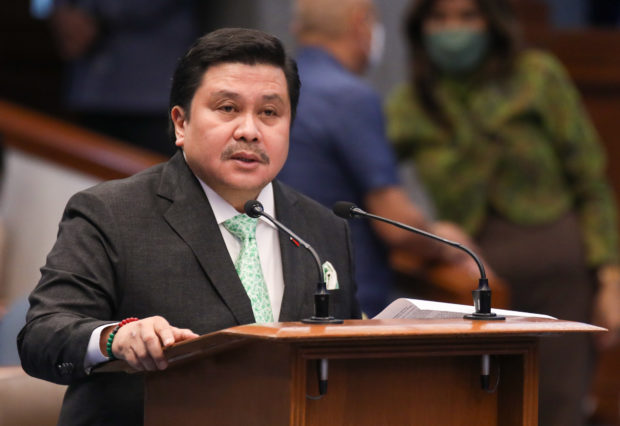Grumblings in AFP must end: Senate bill proposes 5 changes to unpopular 3-year rule

Senator Jinggoy Ejercito Estrada, chairperson of the Committee on national defense, sponsors Senate Bill No. 1849, which seeks to amend Republic Act No. 11709 or “An Act Strengthening Professionalism and Promoting the Continuity of Policies and Modernization Initiatives in the Armed Forces of the Philippines, during plenary session on Tuesday, February 7, 2023 . Courtesy of Bibo Nueva España/Senate PRIB
MANILA, Philippines —The Philippines’ military has some concerns about RA No.11709, and the Senate is responding by proposing a bill that would make five changes to it.
Senate Bill 1849 has been reported by Committee Report 23, and its purpose is to amend the Act Strengthening Professionalism and Promoting the Continuity of Policies and Modernization Initiatives in the military Organization.
On Tuesday, Senator Jinggoy Estrada filed the bill he has been sponsoring in the Senate.
The problems faced by the Armed Forces of the Philippines have been hypothesized to be solved by the reforms proposed in Senate bill, which would result in a more progressive military establishment.
If the bill is voted into law, it might have far-reaching effects on the future of the military and the AFP.
“The concerns of the brave men and women in the AFP are very much valid and understandable given the perceived uncertainty of their military careers na halos buong buhay nilang pinagtrabahuan (that they worked on for almost their whole lives),” he said.
“Although unintended, Republic Act No. 11709 has caused uneasiness, demotivation, and adversely affected the morale of our troops,” he added.
READ: 3-year terms limited to 4 AFP officers
The upcoming amendment prescribes the system of promotions, separations, and maximum service time for enlisted personnel, supervised by the Department of National Defense and the Armed Forces of the Philippines.
The amendment looks to reintroduce a one-year promotion ban and restore the previous tenure-in-grades of colonels, commanders, brigadier generals, and commodores.
As for key officers, the measure puts a cap on the tour of duty to five with a maximum tenure, and allows others to shift laterally to key positions. As for the AFP chief of staff and the Philippine Military Academy superintendent, their respective tour of duty will remain at three and four years.
However, major service commanders’ duration of service will be cut from three to two years.
With regard to the vice chief of staff, deputy chief of staff, unified command commanders, and inspector general, they can transfer laterally, provided that appointment to a tenured key position is subject to the one-year promotion prohibition.
READ: Galvez seeks amendments to AFP promotion law
The bill also seeks an introduction of the graduated age in mandatory retirement for generals and flag officers.
Under the proposed measure, the compulsory retirement age for 1-star generals is 57 and 58 for 2-star generals.
For 3-star generals, mandatory retirement age is 59, but if he/she is sitting in a tenured key position, the maximum tour of duty will take precedence.
Further, the percentages on officer grade distribution will be reintroduced but the basis will be the AFP Table of Organization.
Estrada pointed out that the amendments are “consistent with the spirit and intention of RA 11709 that is anchored on meritocracy and professionalization, while providing the organization with the necessary room for flexibility, ensuring stability, and improving the morale in our armed forces.”
Last month, the DND admitted that there were rumblings within the AFP as the retirement law “gravely affected” the military’s morale.
READ: DND admits rumblings within military